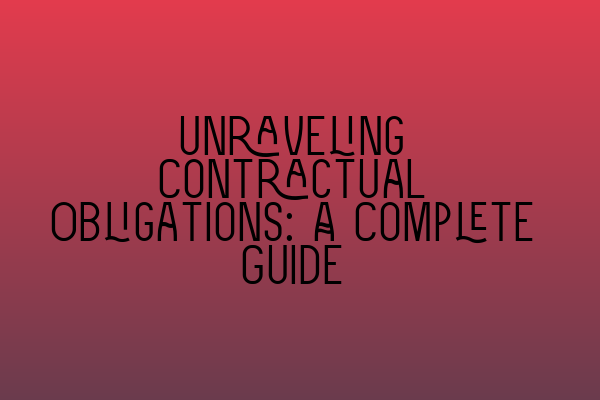Unraveling Contractual Obligations: A Complete Guide
Contracts are the backbone of any business transaction. They set out the rights, obligations, and expectations of parties involved and provide a legally enforceable framework for conducting business. Understanding contractual obligations is crucial for businesses and individuals to avoid disputes and ensure smooth operations.
In this comprehensive guide, we will unravel the intricacies of contractual obligations, exploring their types, implications, and the legal remedies available in case of breach. So, whether you are a business owner, contract professional, or simply curious about contract law, this guide will provide valuable insights into this complex area.
Understanding Contractual Obligations
Contractual obligations are the duties and responsibilities that parties agree to fulfill under the terms of a contract. These obligations can be express, meaning explicitly stated in the contract, or implied, arising from the nature of the relationship between the parties or the law.
Express obligations are typically written and agreed upon by the parties involved. They can include payment terms, delivery schedules, quality standards, and more. Implied obligations, on the other hand, are not explicitly stated but are based on the customs, industry practices, or statutory requirements.
It is essential to have a clear understanding of contractual obligations from the outset. Here are some key points to consider:
1. Identify the Parties’ Obligations
Start by identifying the specific obligations of each party. This can be achieved by carefully reviewing the contract and any accompanying documents or communications. Pay close attention to deadlines, performance standards, and any specific requirements outlined in the contract.
To better comprehend the implications of contractual obligations, it is crucial to be aware of related legal concepts. One such concept is frustration, which can impact the performance of contractual obligations. Explore the Impact of Frustration on Contractual Obligations to gain deeper insights into this area.
2. Ensure Clarity and Precision
Contracts should be drafted with precision and in clear terms to avoid ambiguity. Ambiguous language or vague obligations may lead to disputes and difficulties in enforcing the contract. It is recommended to seek legal advice or engage a contract professional to ensure the clarity of contractual obligations.
One aspect that often requires careful analysis is the interpretation of contractual clauses. Gain valuable insights into this topic by reading our article on Interpreting Contractual Clauses: Unlocking the Hidden Meanings.
3. Consider Legal Aspects
Contractual obligations are subject to various legal aspects that may differ depending on the jurisdiction and the nature of the contract. Business owners and entrepreneurs should be aware of the legal considerations involved in drafting, negotiating, and enforcing contracts. Familiarize yourself with the key legal considerations by reading our article on Legal Aspects of Business Contracts: Key Considerations for Entrepreneurs.
Types of Contractual Obligations
Contractual obligations can take various forms, depending on the nature of the contract and the parties’ intentions. Here are some common types of contractual obligations:
1. Payment Obligations
In many contracts, the primary obligation is the payment of a specified amount by one party to another. The terms and conditions related to payment, such as due dates, installment plans, or penalties for late payment, should be clearly stated in the contract.
2. Performance and Delivery Obligations
Performance and delivery obligations require a party to perform certain actions or deliver goods, services, or assets as agreed upon in the contract. These obligations may include timelines, quality standards, and compliance with specific requirements.
3. Confidentiality and Non-Disclosure Obligations
In contracts involving sensitive information, such as non-disclosure or confidentiality agreements, obligations related to the protection of information are crucial. Parties may be obligated to keep certain information confidential, not disclose it to third parties, or take necessary security measures.
4. Indemnity and Liability Obligations
Indemnity and liability obligations determine the responsibilities and liabilities of the parties in case of damage, loss, or injury. These obligations specify who will bear the costs or compensate for losses arising from the contract or related activities.
Understanding the different types of contractual obligations is essential for effectively managing contracts. To deepen your understanding, take a look at our article on Agreements in Contract Law: Understanding Its Various Types.
Contractual Obligations and Breach
Contractual obligations are legally binding, and failure to fulfill them can lead to a breach of contract. When a party fails to perform its obligations as agreed upon in the contract, the other party may have several legal remedies:
- 1. Seeking specific performance, where the defaulting party is required to fulfill its obligations as promised.
- 2. Claiming damages to compensate for losses suffered as a result of the breach.
- 3. Rescinding or terminating the contract, releasing the parties from further obligations.
It is crucial to understand the legal consequences of breach and the available remedies. Seeking legal advice or consulting a contract professional can help in assessing the options and determining the best course of action.
For an in-depth comparison of SQE Contract Law and traditional qualifications, including their implications on contractual obligations, read our article on SQE Contract Law vs. Traditional Qualifications: A Comparative Analysis.
Conclusion
Contractual obligations are the cornerstone of any business transaction. Understanding the types of obligations, their implications, and the legal remedies available in case of breach is essential for businesses, entrepreneurs, and anyone involved in contract law.
This guide aimed to unravel the complexities of contractual obligations, providing a comprehensive overview of the topic. By gaining a solid understanding of contractual obligations, businesses can protect their interests, minimize risks, and foster successful business relationships.
